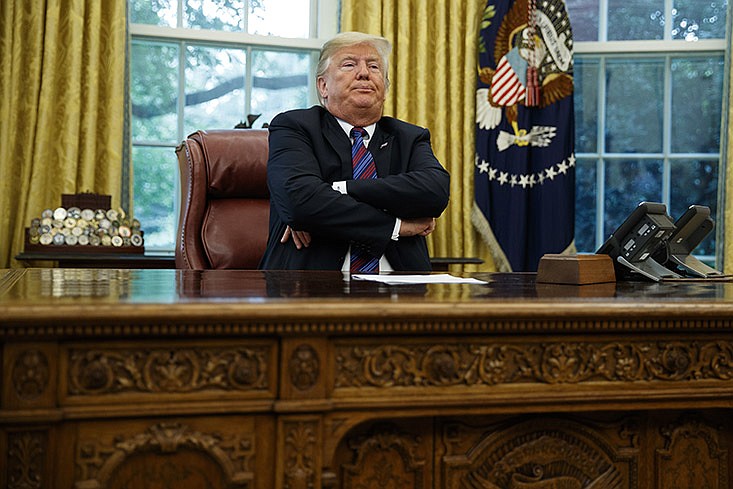We're under no illusions that in the end every "t" will be crossed and every "i" dotted, but we must marvel again that President Donald Trump and his team have accomplished something that experts said couldn't - and maybe shouldn't - get done.
The president on Monday announced a tentative trade agreement with Mexico that ostensibly would replace the nearly 25-year-old old North American Free Trade Agreement (NAFTA).
Trump, since his campaign days, has said he wants to scuttle the agreement with Canada and Mexico and replace it with something that was better for United States workers and businesses. Indeed, he called NAFTA, which has been blamed for the loss of millions of U.S. manufacturing jobs and huge trade deficits, the "worst trade deal ever made."
Wall Street liked the potential deal so much the Dow Jones Industrial average rose 1 percent, closing above 26,000, and the Nasdaq composite index climbed above 8,000 for the first time.
At issue now is whether the Trump administration can bring along Canada, which has sat with its arms crossed and looked the other way while the U.S. negotiated with Mexico. Once the breakthrough was announced, though, Canada's foreign affairs minister announced plans to come to Washington to revive trade talks with the U.S.
As an incentive, Trump, ever the negotiator (and the diplomat), said if Canada doesn't join the deal or make a separate one with the U.S., he just might slap tariffs on vehicles imported from Canada.
We said at the outset that we're under no illusions about a final deal because while the tentative agreement was cheered by groups representing automobile manufacturers, farmers, oil and gas producers, the iron and steel industry, and retailers, other groups felt the original three-way deal was necessary. Some even felt it was legally mandatory, though wording in the governing Trade Promotion Authority is said to be open to interpretation. And, as an actual treaty and not an executive agreement of the type President Barack Obama preferred, such an deal would have to be submitted to Congress.
To date, renegotiation of NAFTA between two individual countries has never been tested.
Yet, Trump's tough, America-first talk has gotten NATO countries to increase their defense spending, as they all committed to do, and moved the European Union off its duff last month to begin work on a zero-tariff deal with the U.S.
Among other tenets, the deal with Mexico would set higher percentages of vehicles that had to be made in North America in order to qualify for lower-tariff import status, would keep agricultural products free of tariffs, would boost wages for Mexican workers (where at least 40 percent of all content would have to be made by workers earning the equivalent of $16 per hour), would raise environmental standards in Mexico, and would redo rules to protect intellectual property and copyrights.
Currently, a minimum 62.5 of the net price of an automobile has to originate in the U.S., Canada or Mexico in order to avoid tariffs. The Trump administration wanted it to be raised to 85 percent but settled for 75 percent.
That particular issue, those familiar with the negotiations said, was one of the main sticking points that stalled the talks in recent months.
The preliminary agreement itself would last 16 years, longer than the five years Trump wanted at the outset but shorter than the unending deal Mexico had in mind. However, the treaty does specify a six-year review in which either or both countries could suggest changes to the agreement.
Whether or not the deal can be made without Canada, the administration must notify Congress of the treaty. It then has 90 days to conduct a review process and then vote on it. Complicating the process is the mid-term elections, which could - but is looking less likely to - change control of Congress.
We hope Canada will loosen its stiff upper lip and come aboard. A trade agreement involving the two closest nations to the U.S. is in the best interests of all three, but the nearly quarter century since NAFTA was signed has proven the agreement was not all sunshine and roses for the U.S. An update was necessary.
Trump once suggested - perhaps again in a power play - that the U.S. should simply withdraw from the agreement, but we appreciate that the administration pressed forward and worked out an improved deal with Mexico. We hope it will do the same with Canada, which does not want to lose better access to the world's largest economy.
Whatever results from this effort, it is clear that an inelegant, narcissistic president hounded by the political left and a national press rabidly out to get him still can put aside the conventional wisdom on trade and attempt to achieve something better for the American worker.
Time will tell whether he is able to achieve it, but we appreciate him going where other presidents wouldn't.
